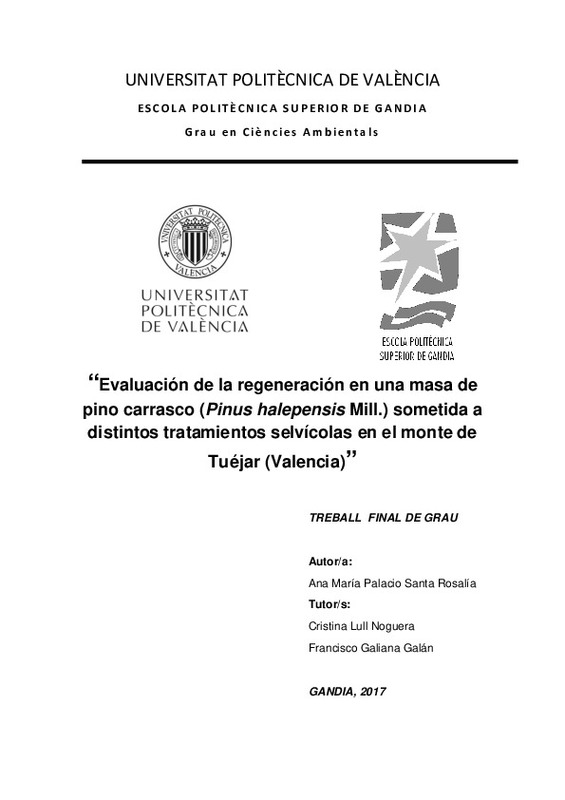|
Resumen:
|
La ordenación, la conservación y el desarrollo sostenible de los montes son fundamentales para la protección del medio ambiente. En 1998, se llevaron a cabo una serie de tratamientos selvícolas con cortas finales de ...[+]
La ordenación, la conservación y el desarrollo sostenible de los montes son fundamentales para la protección del medio ambiente. En 1998, se llevaron a cabo una serie de tratamientos selvícolas con cortas finales de regeneración con un ensayo de siete parcelas experimentales con tres réplicas sobre una masa de Pinus halepensis situadas en los montes de Tuéjar y Chelva. Estas actuaciones sobre la masa, consistieron en cortas finales de entresaca por bosquetes de tres tamaños, cortas con reserva de masa y unos controles sobre un pinar adulto poco intervenido. Las cortas en pinares pueden conllevar una serie de beneficios ambientales, como son el reducir la competencia y, por tanto, proporcionar mayor disponibilidad de agua, luz y nutrientes a los árboles que quedan en pie, aumentar la producción sostenible de biomasa y aumentar la biodiversidad vegetal. Considerando la complejidad que caracteriza el funcionamiento de los ecosistemas forestales mediterráneos y las limitaciones que de ello se derivan, en este estudio se va a estudiar la regeneración natural del pino carrasco tras 18 años de los tratamientos iniciales. El estudio determinará el resultado de la regeneración de la masa según las diferentes respuestas de los tipos de tratamiento. Se caracterizará la población actual reflejando la diferencia entre regenerado y repoblado ya estable, para ello se evaluará las medidas de la altura total del pie, el diámetro basal del tronco, el diámetro normal de los árboles más altos de las muestras realizadas y se realizará una estimación de los datos medios dasométricos del regenerado.
[-]
Conservation, management and sustainable development of forests are vital for the
protection of the environment. Natural regeneration is a determining process for the
maintenance of the forest masses over time. The ...[+]
Conservation, management and sustainable development of forests are vital for the
protection of the environment. Natural regeneration is a determining process for the
maintenance of the forest masses over time. The objective of this work is the study
about the influence of the treatment in a forest mass on the natural regeneration of
Pinus halepensis that took almost twenty years ago in three wooded areas around the
top of Montalbana (Tuéjar and Chelva). Three silvicultural treatments done, consisting
one of them in final cuttings of thinning by clumps, and the other two in a uniform
successive thinning with two intensities (It was prescribed to respect 40% (strong ASU)
and 60% (weak ASU) of the feet). In these three areas there are, in addition, control
plots in which there was no intervention. In this work is collected the result for the
regeneration of the pine in the experimental plots and is analyze different variables of
the P. halepensis related are the physiognomic situation of woodland, distinguishing
between regenerated and disseminated, and taking some parameters of part of the
population as the inventorial height and the basal and normal diameters. In addition,
the percentage of vegetation cover has been measured. I has been found a great
variability in the number of feet regenerated and seedling, the applied silvicultural
treatment seems to condition the regeneration of P. halepensis, being the ASU
treatments the ones with the highest percentage of success
[-]
|








